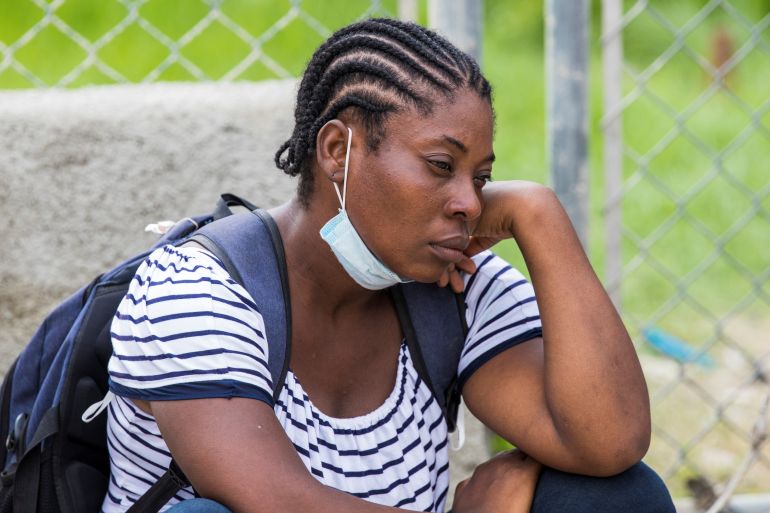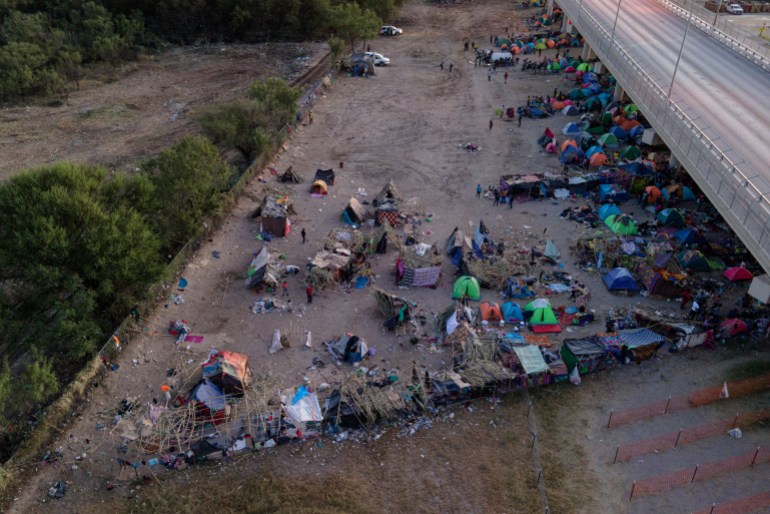Biden vows ‘consequences’ for ill-treatment of Haitian migrants
US president takes responsibility for situation at US-Mexico border where thousands of Haitian migrants have massed.

US President Joe Biden called the treatment of Haitian migrants along the southern border with Mexico an “embarrassment” and promised there would be “consequences” for the United States border guards who aggressively tried to push migrants back.
Footage over the weekend showed border officials on horseback using what appeared to be reins to intimidate migrants who were trying to cross the Rio Grande river. Biden called it “strapping”.
Keep reading
list of 3 items‘Obscene’: Rights groups slam US expulsions of Haitian migrants
Conditions worsen for Haitian migrants on US-Mexico border
Speaking at the White House on Friday, Biden acknowledged that he bears responsibility for the situation along the border. “Of course, I take responsibility. I’m president,” Biden said from the White House. “I promise you those people will pay,” he said of the agents. “It’s simply not who we are.”

Department of Homeland Security Secretary Alejandro Mayorkas said border patrol has now ceased the use of horses and the agents involved have been assigned to administrative duties. The results of an investigation into the treatment of migrants will conclude soon, and will be made public.
“The department does not tolerate any mistreatment of any migrants and will not tolerate any violation of its values, principles and ethics,” Mayorkas said during a news conference on Friday.
Still, there are no plans to stop expelling the migrants, most of them Haitians, who had gathered under a bridge in Del Rio, Texas last week. At its peak, nearly 15,000 migrants were living in a makeshift camp with little access to food, water or sanitation. Mayorkas said there are no more migrants in the camp under the bridge.
He said 2,000 people have been expelled on 17 flights to Haiti since Sunday and about 5,000 migrants were being processed for a possible return to Haiti or placement in US immigration court proceedings. He said 8,000 people decided to return to Mexico voluntarily.
Migrants are being denied the chance to claim asylum and swiftly expelled under “Title 42,” a provision put in place by the Trump administration last year to justify restrictive immigration policies, citing the need to prevent the spread of the coronavirus. The Biden administration has continued to use Title 42 to deport Haitian as well as many Central American migrants.
But pressure has been building against Biden from rights groups who have called the forced expulsions of migrants “obscene“. Pressure is also mounting from among members of Biden’s own Democratic Party, who say migrants are being unjustly mistreated and sent back to a troubled country that some left more than a decade ago.

On Friday, New York Attorney General Letitia James joined a coalition of 17 other attorney generals who in a letter (PDF) addressed to Biden jointly expressed their concern over the apprehension and expulsion of Haitian migrants at the border.
“I have seen the devastating and disturbing photos of border patrol officers on horseback using whips to corral Haitian refugees seeking asylum, and it’s clear that they have not been shown the humanity and concern they are owed,” James said in a statement.
“We are a nation built by immigrants, and we cannot be callous and cruel towards individuals fleeing natural disaster, political instability, extreme poverty, and violence in their home country,” she said.
On Wednesday Ambassador Daniel Foote, the US special envoy to Haiti resigned in protest over the decision to deport Haitians calling it “inhumane and counterproductive”.
Haiti, the poorest nation in the Western Hemisphere, has been hit in recent months by a presidential assassination, gang violence and a major earthquake.
Mexico has also been flying migrants away from the US border and sending some by bus towards its border with Guatemala in the south.
On Friday, Reuters reported that Mexican officials were urging Haitians who were trying to reach the US to give up and return to Mexico’s frontier with Guatemala to request asylum.
But Mexican official data shows Haitians are far less likely to have asylum claims approved in Mexico compared with many nationalities, although the number is starting to improve.
Last year, of all asylum claims that were formally resolved, only 22 percent of Haitian cases won approval, compared with 98 percent for Venezuelans, 85 percent of Hondurans, 83 percent of Salvadorans and 44 percent of Cubans. So far this year, the Haitian number is up to 31 percent.